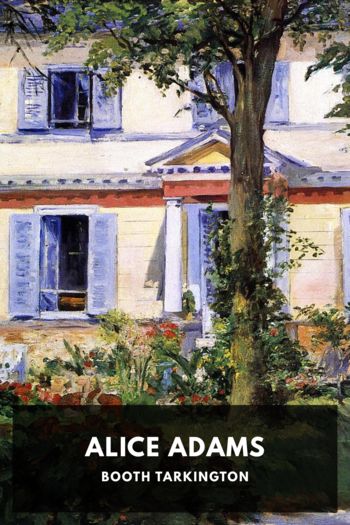National Avenue - Booth Tarkington (the little red hen ebook TXT) 📗

- Author: Booth Tarkington
Book online «National Avenue - Booth Tarkington (the little red hen ebook TXT) 📗». Author Booth Tarkington
By Booth Tarkington.
Table of Contents Titlepage Imprint Dedication National Avenue I II III IV V VI VII VIII IX X XI XII XIII XIV XV XVI XVII XVIII XIX XX XXI XXII XXIII XXIV XXV XXVI XXVII XXVIII XXIX XXX XXXI Colophon Uncopyright ImprintThis ebook is the product of many hours of hard work by volunteers for Standard Ebooks, and builds on the hard work of other literature lovers made possible by the public domain.
This particular ebook is based on a transcription produced for Project Gutenberg and on digital scans available at Google Books.
The writing and artwork within are believed to be in the U.S. public domain, and Standard Ebooks releases this ebook edition under the terms in the CC0 1.0 Universal Public Domain Dedication. For full license information, see the Uncopyright at the end of this ebook.
Standard Ebooks is a volunteer-driven project that produces ebook editions of public domain literature using modern typography, technology, and editorial standards, and distributes them free of cost. You can download this and other ebooks carefully produced for true book lovers at standardebooks.org.
Dedicated
to
S. K. T.
People used to say of the two Oliphant brothers that Harlan Oliphant looked as if he lived in the Oliphants’ house, but Dan didn’t. This was a poor sort of information to anyone who had never seen the house, but of course the supposition was that everybody had seen it and was familiar with its significance. It stood in a great, fine yard, in that row of great, fine yards at the upper end of National Avenue, before the avenue swung off obliquely and changed its name to Amberson Boulevard. The houses in the long row were such houses as are built no more; bricklayers worked for a dollar a day and the workman’s day was ten hours long when National Avenue grew into its glory. Those houses were of a big-walled solidity to withstand time, fire, and tornado, but they found another assailant not to be resisted by anything: this conqueror, called Progress, being the growth of the city. Until the growth came they were indomitable and fit for the centuries.
Moreover, they were of a dignified spaciousness not now to be accomplished except by millionaires with wives content to spend their days getting new servants. The New Yorker, admitted to these interiors upon a visit westward, discovered an amplitude with which he had little familiarity at home, where the brownstone fronts and squeezed apartments showed him no such suites of big rooms; for, of all the million people in New York, only a dozen families could have houses comparable in size or stateliness. “Stately” was the word, though here some little care must be taken, of course, with an eye to those who will not admit that anything short of Blenheim or the Luxembourg is stately. The stateliness of the Oliphants’ house was precisely the point in that popular discrimination between the two young men who lived there: Harlan Oliphant, like the house, was supposed to partake of this high quality, but stateliness was the last thing anyone ever thought of in connection with Dan.
The youth of the brothers, in the happy and comfortable nineties of the last century, is well remembered in their city, where the Christmas holidays could never be thought really begun till the two Oliphants had arrived from college and their broad-shouldered, long-tailed coats and incredibly high white collars were seen officially moving in the figures of a cotillion. They usually arrived on the same day, though often not by the same train; but this was the mark of no disagreement or avoidance of each other, yet bore some significance upon the difference between them. It was the fashion to say of them that never were two brothers so alike yet so unlike; and although both were tall, with blue eyes, brown hair, and features of pleasant contour decisively outlined in what is called a family likeness, people who knew them well found it a satisfying and insoluble puzzle that they were the offspring of the same father and mother.
The contrast appeared in childhood and was manifest to even the casual onlooker when Dan Oliphant was eleven or twelve years old and Harlan ten or eleven. At that age Harlan was already an aristocrat, and, what is more remarkable, kept himself always immaculate. If his collar rumpled or was soiled he went immediately to his room and got a fresh one; he washed his hands three or four times a day without parental suggestion and he brushed his hair almost every time he washed his hands. He was fastidious in his choice of companions, had no taste for chance acquaintances, and on a school holiday could most frequently be found in the library at home, reading a book beyond his years. The lively Daniel, on the contrary, disported himself about the neighbourhood—or about other neighbourhoods, for that matter—in whatever society offered him any prospect of gayety. He played marbles “for keeps” with ragtag and bobtail on every vacant lot in town; he never washed his hands or face, or brushed his hair, except upon repeated command, yet loved water well enough to “run off swimming” and dive through a film of ice upon an early Saturday in March. He regaled himself with horseplay up and down the alleys and had long talks with negro coachmen in their stables, acquiring strange wisdom of them; he learned how to swear with some intricacy, how to smoke almost anything not fireproof, how to “inhale,” how to gamble with implements more sophisticated than marbles,





Comments (0)